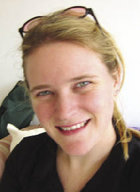Alyson Covino
Finding Harmony on the Water
 After leaving Peabody with a master’s in music composition under her belt, Covino debated her next move. A talented composer with a list of awards and compositions to her name, Covino decided that she wanted to teach. She began working in the Baltimore City school system as a music instructor at a school not far from the Baltimore Rowing Club, where she continued to row competitively. Little did she know, but that decision would ultimately change the lives of many students.
After leaving Peabody with a master’s in music composition under her belt, Covino debated her next move. A talented composer with a list of awards and compositions to her name, Covino decided that she wanted to teach. She began working in the Baltimore City school system as a music instructor at a school not far from the Baltimore Rowing Club, where she continued to row competitively. Little did she know, but that decision would ultimately change the lives of many students.
Covino brought not only her passion for music to her students, she also introduced them to rowing, a sport rarely offered in an urban setting. Covino helped launch a pilot scholarship program through the Baltimore Rowing Club that allowed 14- to 18-year-olds from her Cherry Hill school access to the water. Normally a costly extracurricular activity, the program gave students the opportunity to compete.
Starting a competitive rowing team from scratch was a challenging endeavor, Covino says. Many of the kids had never been involved in water activities, she notes, so it was tricky just getting some of them in the water, let alone skilled in the finer points of the sport. Covino showed her students that, like a great orchestra piece, rowing is all about working in harmony. “When you’re in a boat with eight other people, it is the ultimate team sport,” Covino told The Baltimore Sun in an article about her program that appeared in June 2007. “You have to be in sync with each other or your boat is not going to move.”
The program became such a success that local developer Patrick Turner and national manufacturing company Honeywell International announced a $100,000 grant last summer to help keep it running for years to come.
Today, Covino teaches both music and drama at Baltimore’s Digital Harbor High School and she also continues to compose music for both adults and children. After a busy day in the classroom, she meets her students on the water for an afternoon practice. During crew season, Covino spends her weekends traveling with her students to competitions. She wouldn’t have it any other way.
—Elizabeth Evitts